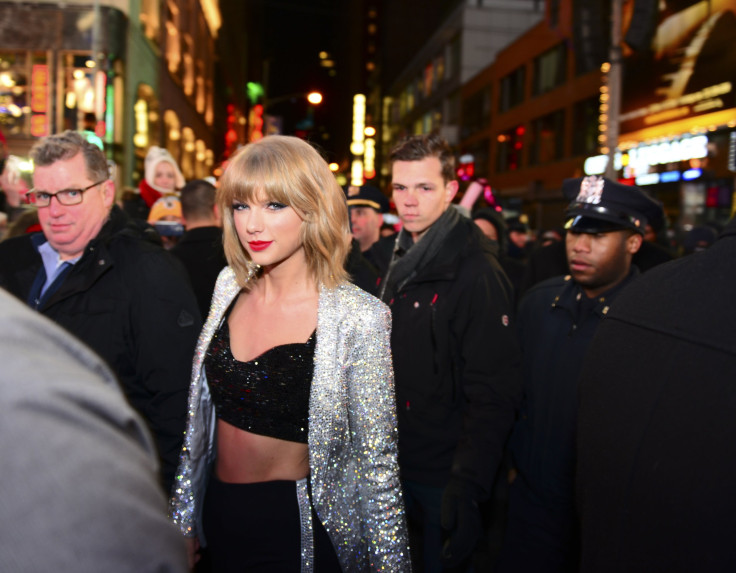Taylor Swift's Diet Coca-Cola Endorsement Conflicts With Her Cancer Charities; Called Out By Medical Experts

Celebrities endorse everything from shoes to eye shadow, but when A-listers do it, a product may exceed quarterly sales projections — not to mention impact the public's opinion of the product. Taylor Swift has recently been called out by the Center for Science in the Public Interest (CSPI) to step up and be a better role model for public health by putting down the infamous red and white diet Coca-Cola can.
Swift partnered with the soda company almost two years ago in January 2013 and has been one of the corporation’s biggest brand ambassadors since she signed. When she announced her partnership in a video message released on YouTube, she asked her fans to “like” Diet Coke’s Facebook page and continued to support the aspartame-laced drink on her Twitter page, followed by 50 million strong. Every time the Grammy-winning singer poses with a diet Coke, her leverage over what her own impressionable fans will drink is what makes her a threat to public health, according to CSPI.
"Your endorsement carries great weight with your millions of young fans," CSPI executive director Michael F. Jacobson, wrote in an open letter to Swift. “To the extent that your endorsement encourages them to begin drinking Diet Coke, or to drink more, your endorsement is likely increasing your fans' risk of cancer. Even if the increase in risk is small, we question whether you would want to lend your name, image, and reputation to any product linked to any increased risk of cancer."
Aspartame has long been demonized in the public eye for the kidney tumors, leukemias, lymphomas, and liver, lung, and breast cancer it has caused in animal studies. There is a general consensus in the medical community that daily consumption of aspartame should be avoided, and food manufacturers should look into other alternative solutions for sweetening up their products. In addition, the drink’s caramel food coloring has been linked to ADHD and other side effects from caffeine.
Celebrities: Be Careful What You 'Cheers'
"As the public face of Diet Coke, Taylor Swift is the public face of aspartame," Jacobson said. "She might be doing more to promote aspartame consumption than anyone on Earth."
It’s a multifaceted issue. Coke does a disservice to the future of America’s health by preying on children, the government by regulating company's targeted and highly strategic advertising, parents for not fighting hard enough for their children, and celebrities for pushing unhealthy products through their white-knuckle influence over their fan base.
The average American child sees about 30,000 advertisements each year. Companies are well aware of the statistics and have marketing teams working on new ways to lure consumers to their brands while they're young, in hopes they’ve hooked them into adulthood. So, it’s either celebrities are so disconnected from the science they succumb to the point of ignorance, or they just don’t care. CSPI is trying to turn Swift’s influence around by promoting the hashtag #ShakeOffAspartame, putting a twist on her latest number one Billboard Hot 100 song “Shake It Off.”
The derisive motives of a company pruning the young to mature into full-blown soda drinkers is made easier by the likes of Swift and her spellbinding red lips as she sucks down another gulp of carbonated liquid sugar. By the time a child grows to understand the sales pitchy ways of the world, they may have already developed type 2 diabetes or have become overweight or obese, just like more than one-third of children in America today.
Swift isn’t just endorsing the consumption of carcinogens, but has at the same time become one of the most philanthropic celebrities to date with special focus on cancer-related charities. The hypocrisy of her multi-million-dollar deal with The Coca-Cola Company makes the drinkable irony contemptuous. She even debuted a heartfelt ballad called “Ronan” at the Stand Up to Cancer performance in 2012, which was dedicated to a 4-year-old boy who died of a cancerous tumor, and all proceeds funded cancer research. CSPI praises her prolific charity work and hopes she can see the inconsistent message her diet soda campaign sends out.
"Celebrities are free to endorse whatever they want, but celebrities at Swift's level can afford to be choosy and have high standards," Jacobson said. "They shouldn't use their influence, especially their influence over children, to market junk foods."
Published by Medicaldaily.com



























